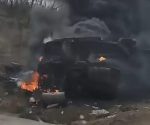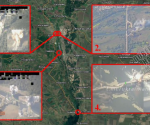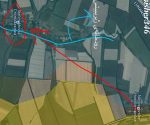In 9/11 Season, More on how “Nineteen Eighteen Four” tells of UK Government shelling its own citizens during World War II
In the days and weeks around the 20th anniversary of the controlled demolition of a number of buildings in New York City’s World Trade Centre, where 2,606 people died, it is an apt time for the promised FBEL series looking at the UK Government’s deliberate shelling of British citizens during World War II. Orwell’s book, Nineteen Eighty Four, suggests that the shelling that certainly did occur, as documented in Secret Casualties of World War Two: Uncovering the Civilian Deaths from Friendly Fire, by Simon Webb (which will be our handbook in the matter), was performed on purpose as a means to ensure that the British populace had an appetite for remaining in a war that UK Government had made a miscalculation about when it had engineered it, found itself losing badly, and though peace could have been had at any time, could not let end until the USA had acquired the reason, capability and domestic opinion in order to be able to join.
As has been explored in a previous FBEL article (please find a link in the piece mentioned below), the so-called Battle of Britain was a trap set by UK Government so that Germany would engage in a futile military venture that she couldn’t win, so that when she came to her senses and stopped the operation, UK Government could claim Victory – the significance of the use of the capitalised word will become apparent soon. The Battle of Britain was important as a fake triumph that was supposed, in 1940, to counter realistic ideas in British citizenry of inevitable defeat manifesting from observation of German battlefield supremacy, or at least never-ending war that couldn’t be won by their side, but it also had other uses. It prevented the emergence of another phoney war after the fall of France in which British people would have had more confirmation that Germany, like she claimed, didn’t want to fight Britain. For the purpose of getting the US military involved, it meant newsreel for consumption in the States showing Londoners being bombed out of their homes – of course, what wasn’t mentioned was how this was something that UK Government had provoked.
But this article isn’t an introduction to the upcoming series all about that bombing for propaganda (one of those can be found in the form of Lessons From Nineteen Eighty Four: A Prelude To A Series On The Deliberate Wartime Shelling Of British Civilians – link) – this is to bring the reader further clues from Orwell’s book to show how very certain we can be regarding what it was about.
As always as it seems to be with these things, there is a central piece of evidence in Nineteen Eighty Four which is so obvious that it makes one wonder that in all the time that the book has been available for a public to read, it must have been deliberately overlooked:
Winston was in Victory Square before the appointed time. He wandered round the base of the enormous fluted column, at the top of which Big Brother’s statue gazed southward towards the skies where he had vanquished the Eurasian aeroplanes (the Eastasian aeroplanes, it had been, a few years ago) in the Battle of Airstrip One.
The location is Trafalgar Square, renamed with the “propaganda logo” for all products of the centrally planned economy of Oceania. And now we understand that the whole political and societal environment in the book hangs off the fake British win in the Battle of Britain, because this is the historical event that is being alluded to.
First of all, to deal with this absolutely, we know the location is Trafalgar Square, not just because of the mention of the structure where a statue of “Big Brother” has replaced Nelson, but because of the adjacency to St Martin’s-in-the-Fields, which is established in the text. Therefore, the real military victory that was the Battle of Trafalgar is no longer commemorated (especially significant because all shades of socialist like to ignore the inconvenience of working Georgian capitalism, and 18th century gentrification and elimination of differences between the classes†), replaced instead by the phoney victory of the Battle of Britain. This is the physical landscape of the book, but it represents the psychological landscape of the wartime socialist technocratic UK Government as it waged war as a pretext to usher fundamental social change, and immediately found itself floundering.
It’s not surprising the spectre of endless war would haunt Orwell’s book. In 1942, when Eric Blair (the real person) was working for the BBC to produce war propaganda, and keeping his wartime diary, and his wife had been separated from him at days on end because of her work in the Censorship Department of the Ministry of Information (suggesting equivalence to Winston Smith’s own estranged wife), the world powers that would become the three of Nineteen Eighty Four would be Japan, whoever would prevail in the fight between Russia and Germany over the European landmass, and the USA/UK Anglo-globalists (even then). Before 1942 into 1943, Britain had mostly been losing, Germany had been strident. However, in 1942, somewhat in the middle of Orwell’s BBC tenure, there was exactly the same sort of situation in the war as one finds in the book. In the book, north and mid Africa, the Middle East, India, Burma and the Indonesian islands are territory up for grabs, with the back and forth of fortunes most famously demonstrated on the African Mediterranean coast. French holdings were in the process of changing sides again, this time from Vichy into the hands of the Allies – so that we must think of how the powers in Nineteen Eighty Four are said to make their most significant progress through acts of treachery (Orwell’s BBC propaganda was aimed at preventing India going over to the Germans). At last, the Germans had become bogged down like H.G. Wells had envisioned they should have in Poland when he and his ilk had been planning the war, although in Russia as things turned out. Moreover, there was no way westwards for Germany, not because of the Battle of Britain, but because it had never been possible to cross the sea in the way that was required. As for Japan, it had now butted up against the USA – and wouldn’t mix it with the Russians, please notice.
Crucially, then, transposing the very evident lesson from Nineteen Eighty Four, in the middle of World War II, with the propaganda peg of fake Battle of Britain triumph there to hang everything else on, the UK Government’s famous V for Victory emblem (via a campaign by the BBC) would be a cynical device to have people, not just in Britain, doublethink about eventual justice in the midst of a war that would not end. The Victory brand in the book stands for the same thing: suffering as a sacrifice to a greater end, with the message being, this product is bad, but that means we’re winning – and we will win. Of course, before 1943 the idea of winning the Second World War had to defy all the indicators (again, this is why the Germans had to be lured into bombing Britain, with UK Government enhancing the results, so that a spirit to continue could be manufactured). In the book, there is some very telling moments; the following is from Chapter Two:
‘Attention! Your attention, please! A newsflash has this moment arrived from the Malabar front. Our forces in South India have won a glorious victory. I am authorized to say that the action we are now reporting may well bring the war within measurable distance of its end. Here is the newsflash—-‘
Bad news coming, thought Winston. And sure enough, following on a gory description of the annihilation of a Eurasian army, with stupendous figures of killed and prisoners, came the announcement that, as from next week, the chocolate ration would be reduced from thirty grammes to twenty.
Winston belched again. The gin was wearing off, leaving a deflated feeling. The telescreen–perhaps to celebrate the victory, perhaps to drown the memory of the lost chocolate–crashed into ‘Oceania, ’tis for thee’. You were supposed to stand to attention. However, in his present position he was invisible.
‘Oceania, ’tis for thee’ gave way to lighter music. Winston walked over to the window, keeping his back to the telescreen. The day was still cold and clear. Somewhere far away a rocket bomb exploded with a dull, reverberating roar. About twenty or thirty of them a week were falling on London at present.
What happens here is that a report about a famous victory is used to cushion the blow regarding food rations (a thing suffered also by World War II time Britons). Smith’s reaction is glorious: he acts as though he’s not unused to the combination: it points to the victory being a pure media invention. Please also note the mention of the distant bomb, and the frequency of enemy bombing, because towards this topic, of course, is where this is all heading.
In Chapter Five, there is a wonderful moment when the reader is explicitly told that news of military success is not to be believed:
It was terribly dangerous to let your thoughts wander when you were in any public place or within range of a telescreen. The smallest thing could give you away. A nervous tic, an unconscious look of anxiety, a habit of muttering to yourself–anything that carried with it the suggestion of abnormality, of having something to hide. In any case, to wear an improper expression on your face (to look incredulous when a victory was announced, for example) was itself a punishable offence. There was even a word for it in Newspeak: FACECRIME, it was called.
What this is pointing to is consciousness even during the war that Britain didn’t really win against Germany in an extended air warfare that took place after the fall of France. There wasn’t really a break in the sequence of continual losing. Moreover, the idea of Britain being able to win a battle, let alone a war, was something that couldn’t be believed. Now, if this was the feeling in the bureaucracy of the wartime UK Government, it’s understandable that its leadership, with its very survival dependent on remaining in the war, would throw all the capability available to it, in terms of spy craft, and harsh secret punishment, against that class of people – and this sort of thing that would never make the official history books is what Orwell is undoubtedly also writing about.
It follows, then, that when Orwell tells us, using his literary disguise, that this same class of people, with first-hand experience (and fear) of the machinations of Government-by-hoax, suspected that UK Government, quite deliberately, shelled the proletariat (the movers of industrial muscle who had to be made to want to be vengeful against the seeming perpetrators), then it is something that we should sit up and take notice of.
We’ve already looked at two moments from the book that very strongly suggest Orwell’s message (see the article linked to above), and now we’ve detected an indication that the Battle of Britain was indeed a propaganda exercise that would need to be augmented to make it fit for purpose. The following is an extract that tells us that the proletariat, in Nineteen Eighty Four, appear to be exclusively targeted – after all, while the bureaucratic class had telescreens, bombing was the method by which the lowest class could be controlled (from Chapter Eight). Winston is walking “kilometres distant from any quarter where party members lived”:
The blue overalls of the Party could not be a common sight in a street like this. Indeed, it was unwise to be seen in such places, unless you had definite business there. The patrols might stop you if you happened to run into them. ‘May I see your papers, comrade? What are you doing here? What time did you leave work? Is this your usual way home?’–and so on and so forth. Not that there was any rule against walking home by an unusual route: but it was enough to draw attention to you if the Thought Police heard about it.
Suddenly the whole street was in commotion. There were yells of warning from all sides. People were shooting into the doorways like rabbits. A young woman leapt out of a doorway a little ahead of Winston, grabbed up a tiny child playing in a puddle, whipped her apron round it, and leapt back again, all in one movement. At the same instant a man in a concertina-like black suit, who had emerged from a side alley, ran towards Winston, pointing excitedly to the sky.
‘Steamer!’ he yelled. ‘Look out, guv’nor! Bang over’ead! Lay down quick!’
‘Steamer’ was a nickname which, for some reason, the proles applied to rocket bombs. Winston promptly flung himself on his face. The proles were nearly always right when they gave you a warning of this kind. They seemed to possess some kind of instinct which told them several seconds in advance when a rocket was coming, although the rockets supposedly travelled faster than sound. Winston clasped his forearms above his head. There was a roar that seemed to make the pavement heave; a shower of light objects pattered on to his back. When he stood up he found that he was covered with fragments of glass from the nearest window.
He walked on. The bomb had demolished a group of houses 200 metres up the street. A black plume of smoke hung in the sky, and below it a cloud of plaster dust in which a crowd was already forming around the ruins. There was a little pile of plaster lying on the pavement ahead of him, and in the middle of it he could see a bright red streak. When he got up to it he saw that it was a human hand severed at the wrist. Apart from the bloody stump, the hand was so completely whitened as to resemble a plaster cast.
He kicked the thing into the gutter, and then, to avoid the crowd, turned down a side-street to the right. Within three or four minutes he was out of the area which the bomb had affected, and the sordid swarming life of the streets was going on as though nothing had happened.
Smith actually is desensitised because of visits to the cinema where he can see this exact same gory detail in what appears to be snuff movies, but we sense that he is not used to being bombed in the same way as the proletariat are. In fact, the proletariat have developed an instinct for the arrival of death and destruction that Smith does not possess. Remember in the extract above how the bomb fell far away from Smith’s quarters? Well, it can only now reinforce the inevitable picture we must have of self-inflicted harm, where supposedly foreign bombs are made to land exactly where they are most useful to the domestic government – and this is exactly a feature of the bombing of England during the Battle of Britain and the blitz. This was such a big issue that at one point the “Germans” kindly started bombing more affluent areas of London so that UK Government could encourage an “all in it together” attitude and prevent the working classes of the city being resentful (and striking, or abandoning the city). This is why the “Germans” kindly conveniently bombed Buckingham Palace (no great damage was done), so that the she-chief-parasite could be had to say (by a propagandist) that she could look the working classes in the eye.
Talking of parasites, people think Winston Smith is so-called because he’s opposed to totalitarians as a sort of anti-hero (less fat-on-all-the-rations) version of Churchill, but this is not so. Winston is so called because it points to the identity of Big Brother. Winston Churchill is entirely associated with “winning” the Battle of Britain. Big Brother is credited with “winning” the Battle of Airstrip One. Winston Churchill is Big Brother – or rather, the symbol that Churchill represents is the same one as does Big Brother. Whether intended by Orwell or not, this is a huge joke on millions of enormously duped Churchill-venerating Britons, long dead and still alive (determined to remain stupid), and even yet to be born.
† A separate critique of Orwell’s economic-political history of the world as presented in Goldstein’s book-within-a-book in Nineteen Eighty Four is sorely required, and one day the author will produce one.



















Another author that was delivering the same message about bombing our own side was Joseph Heller in Catch 22.